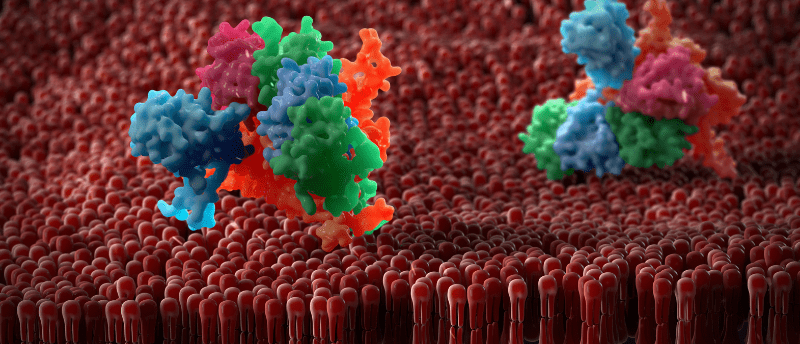Problem-free preparation of active-form membrane proteins

AMSBIO (Oxford, UK) announce a new range of Synthetic Nanodiscs, which enable preparation of multi-pass transmembrane proteins in their active form, revolutionizing the future of membrane protein research and drug development.
Membrane proteins account for more than 60% of all FDA-approved drug targets and 90% of antibody-based drug targets. Many traditional sample preparation methods struggle with challenges in obtaining water-soluble and bioactive forms of multi-pass transmembrane proteins.
Commonly, detergent has been widely used to produce multi-pass transmembrane proteins. However, a major downside of this technique is that the detergent cannot be completely removed. This can be problematic for downstream applications, as the presence of detergent may interfere with experiments or affect the protein structure.
An alternative technique to obtain proteins with good solubility and correct folding is to use peptides derived from the N-terminus or extracellular loops. Unfortunately, transmembrane proteins prepared via this method may not retain the structural features and conformation of the original extracellular loops of the transmembrane protein in the native membrane.
Another method is to use membrane fractions, whole cells or virus-like particles to maintain the natural structure of transmembrane proteins; however, immunization with these products has been shown to result in high levels of non-specific antibody background.
Based upon an innovative polymer-based platform, Synthetic Nanodiscs offer a more advanced solution compared with these traditional solutions. Synthetic Nanodiscs have been shown, in multiple applications, to produce full-length membrane proteins with high purity and excellent solubility in aqueous solutions. Beneficially, the proteins incorporated into Synthetic Nanodiscs are in a native membrane environment, ensuring they remain biologically active. There is no detergent in these products, making them suitable to use in cell- based assays and other experiments.
Overall, Synthetic Nanodiscs eliminate the need for membrane scaffold proteins, creating a streamlined, cleaner system with reduced interference in downstream assays. In this way, our Synthetic Nanodiscs enable the functional characterization of multi-pass transmembrane proteins in their active form, revolutionizing membrane protein research and drug development.
For further information on Synthetic Nanodiscs, please visit their website or contact them directly.
Founded in 1987, AMSBIO is recognized today as a leading transatlantic company contributing to the acceleration of discovery through the provision of cutting-edge life science technology, products and services for R&D in the medical, nutrition, cosmetics and energy industries. AMSBIO has in-depth expertise in extracellular matrices to provide elegant solutions for studying cell motility, migration, invasion and proliferation. This expertise in cell culture and the extracellular matrix allows AMSBIO to partner with clients in tailoring cell systems to enhance organoid and spheroid screening outcomes using a variety of 3D culture systems, including organ-on-a-chip microfluidics. For drug discovery research, AMSBIO offers assays, recombinant proteins and cell lines. Drawing upon a huge and comprehensive biorepository, AMSBIO is widely recognized as a leading provider of high-quality tissue specimens (including custom procurement) from both human and animal tissues. The company provides unique clinical–grade products for stem cells and cell therapy applications. This includes GMP cryopreservation technology and high-quality solutions for viral delivery.